Critical Analysis of a Research Paper: DAPT Therapy and CABG
VerifiedAdded on 2022/12/28
|11
|3161
|2
Report
AI Summary
This report presents a critical analysis of a research paper that investigates the efficacy and safety of dual antiplatelet therapy (DAPT) involving aspirin and clopidogrel in patients undergoing coronary artery bypass grafting (CABG). The analysis includes a detailed examination of the research methodology, encompassing study design, search strategies, eligibility criteria, data extraction, and statistical methods. The paper's findings, including the comparison of DAPT versus non-antiplatelet therapy and aspirin therapy alone, are thoroughly reviewed. The report discusses the study's strengths and weaknesses, limitations, and conclusions regarding the impact of DAPT on outcomes such as mortality, myocardial infarction, cardiovascular accidents, and bleeding risks. The analysis highlights the importance of considering the balance between reducing ischemic events and the potential for increased bleeding complications associated with DAPT in the context of CABG.
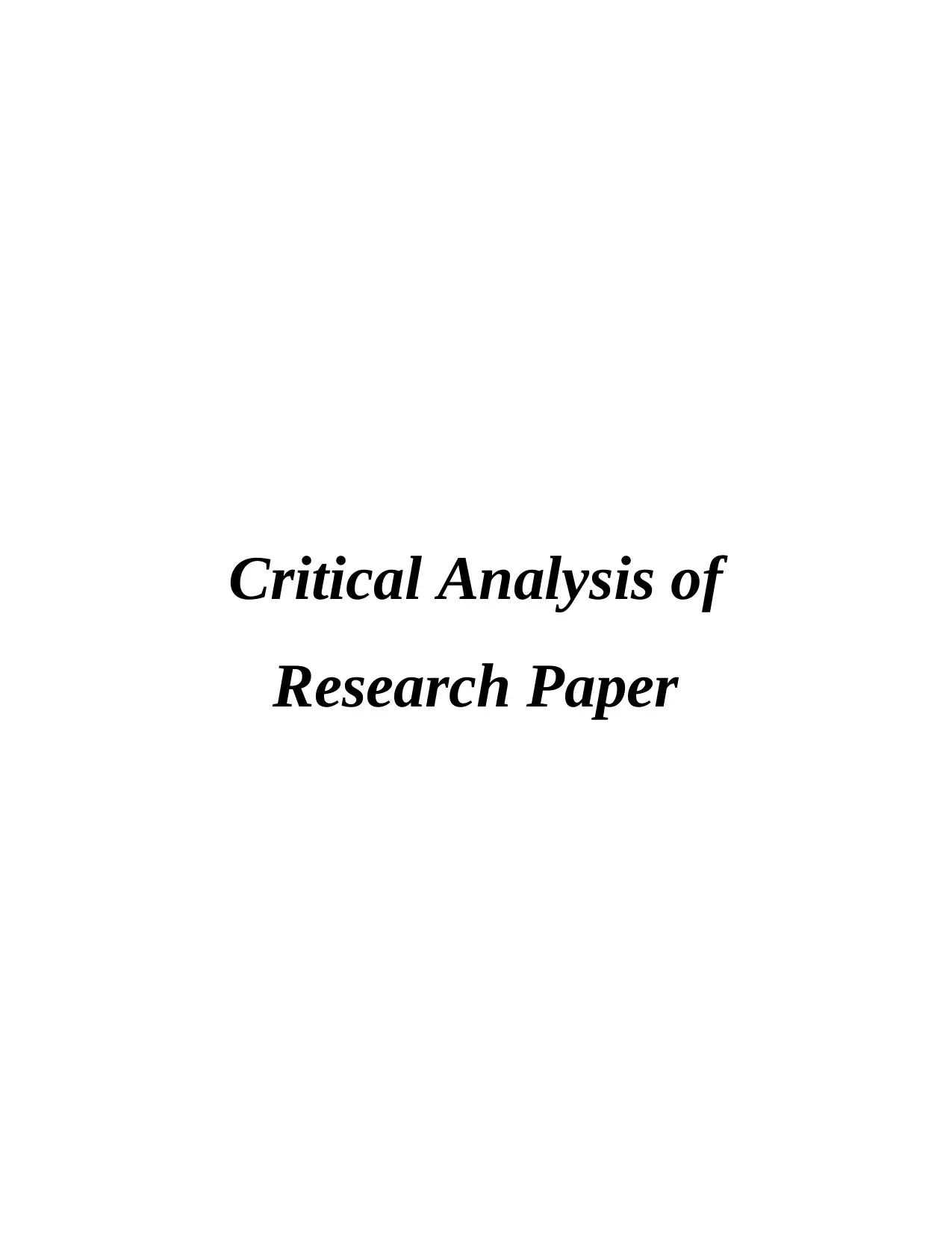
Critical Analysis of
Research Paper
Research Paper
Paraphrase This Document
Need a fresh take? Get an instant paraphrase of this document with our AI Paraphraser
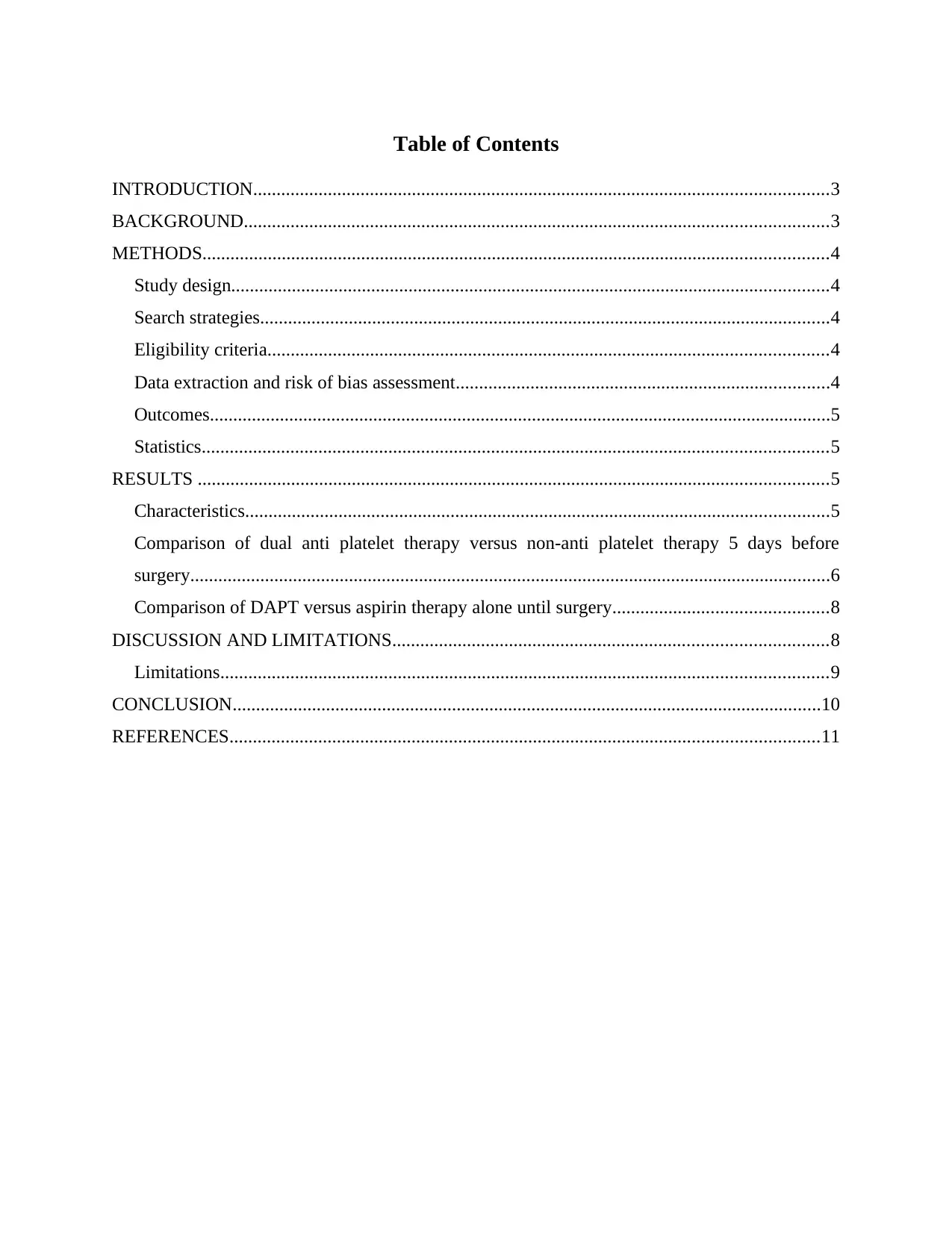
Table of Contents
INTRODUCTION...........................................................................................................................3
BACKGROUND.............................................................................................................................3
METHODS......................................................................................................................................4
Study design................................................................................................................................4
Search strategies..........................................................................................................................4
Eligibility criteria........................................................................................................................4
Data extraction and risk of bias assessment................................................................................4
Outcomes.....................................................................................................................................5
Statistics......................................................................................................................................5
RESULTS .......................................................................................................................................5
Characteristics.............................................................................................................................5
Comparison of dual anti platelet therapy versus non-anti platelet therapy 5 days before
surgery.........................................................................................................................................6
Comparison of DAPT versus aspirin therapy alone until surgery..............................................8
DISCUSSION AND LIMITATIONS.............................................................................................8
Limitations..................................................................................................................................9
CONCLUSION..............................................................................................................................10
REFERENCES..............................................................................................................................11
INTRODUCTION...........................................................................................................................3
BACKGROUND.............................................................................................................................3
METHODS......................................................................................................................................4
Study design................................................................................................................................4
Search strategies..........................................................................................................................4
Eligibility criteria........................................................................................................................4
Data extraction and risk of bias assessment................................................................................4
Outcomes.....................................................................................................................................5
Statistics......................................................................................................................................5
RESULTS .......................................................................................................................................5
Characteristics.............................................................................................................................5
Comparison of dual anti platelet therapy versus non-anti platelet therapy 5 days before
surgery.........................................................................................................................................6
Comparison of DAPT versus aspirin therapy alone until surgery..............................................8
DISCUSSION AND LIMITATIONS.............................................................................................8
Limitations..................................................................................................................................9
CONCLUSION..............................................................................................................................10
REFERENCES..............................................................................................................................11
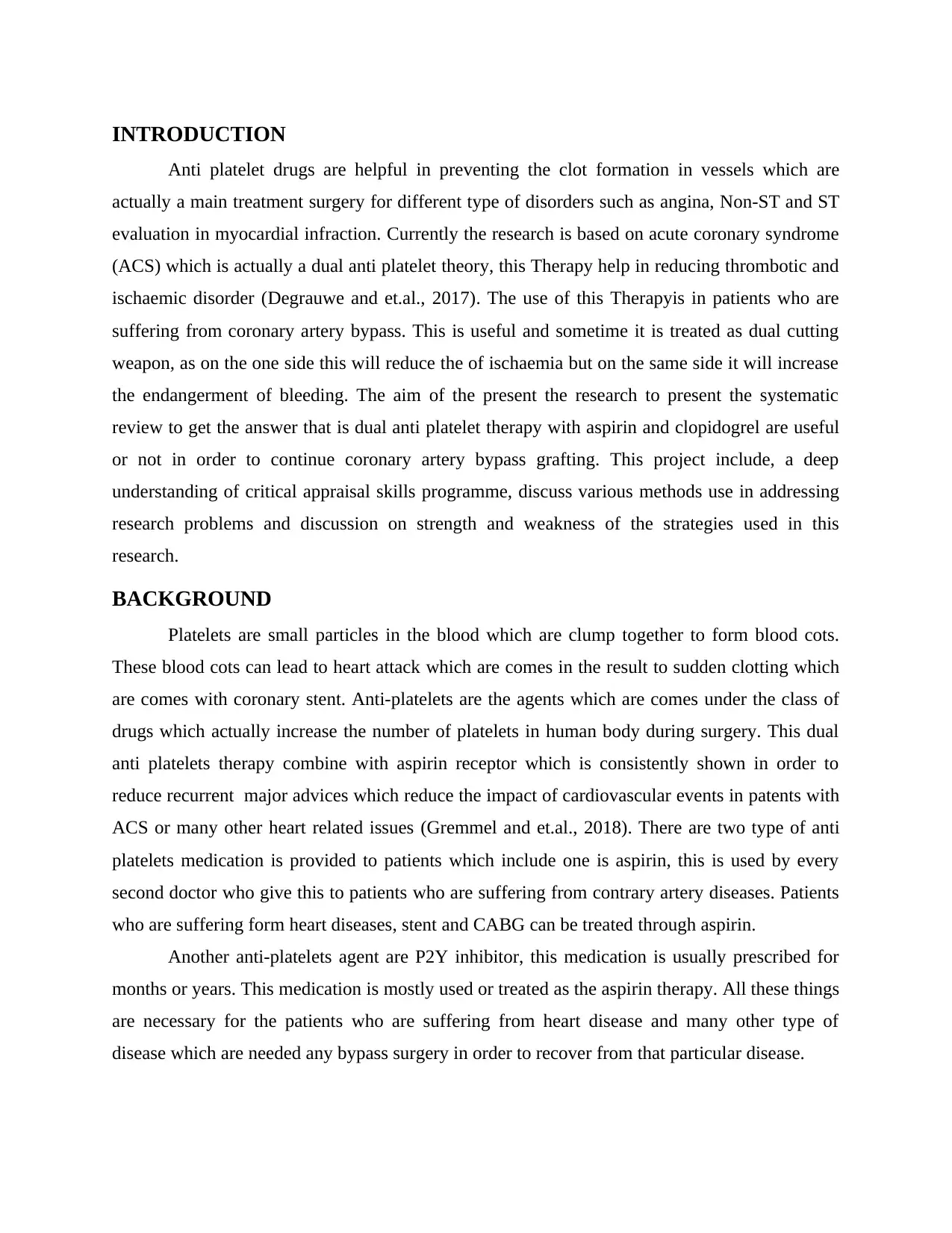
INTRODUCTION
Anti platelet drugs are helpful in preventing the clot formation in vessels which are
actually a main treatment surgery for different type of disorders such as angina, Non-ST and ST
evaluation in myocardial infraction. Currently the research is based on acute coronary syndrome
(ACS) which is actually a dual anti platelet theory, this Therapy help in reducing thrombotic and
ischaemic disorder (Degrauwe and et.al., 2017). The use of this Therapyis in patients who are
suffering from coronary artery bypass. This is useful and sometime it is treated as dual cutting
weapon, as on the one side this will reduce the of ischaemia but on the same side it will increase
the endangerment of bleeding. The aim of the present the research to present the systematic
review to get the answer that is dual anti platelet therapy with aspirin and clopidogrel are useful
or not in order to continue coronary artery bypass grafting. This project include, a deep
understanding of critical appraisal skills programme, discuss various methods use in addressing
research problems and discussion on strength and weakness of the strategies used in this
research.
BACKGROUND
Platelets are small particles in the blood which are clump together to form blood cots.
These blood cots can lead to heart attack which are comes in the result to sudden clotting which
are comes with coronary stent. Anti-platelets are the agents which are comes under the class of
drugs which actually increase the number of platelets in human body during surgery. This dual
anti platelets therapy combine with aspirin receptor which is consistently shown in order to
reduce recurrent major advices which reduce the impact of cardiovascular events in patents with
ACS or many other heart related issues (Gremmel and et.al., 2018). There are two type of anti
platelets medication is provided to patients which include one is aspirin, this is used by every
second doctor who give this to patients who are suffering from contrary artery diseases. Patients
who are suffering form heart diseases, stent and CABG can be treated through aspirin.
Another anti-platelets agent are P2Y inhibitor, this medication is usually prescribed for
months or years. This medication is mostly used or treated as the aspirin therapy. All these things
are necessary for the patients who are suffering from heart disease and many other type of
disease which are needed any bypass surgery in order to recover from that particular disease.
Anti platelet drugs are helpful in preventing the clot formation in vessels which are
actually a main treatment surgery for different type of disorders such as angina, Non-ST and ST
evaluation in myocardial infraction. Currently the research is based on acute coronary syndrome
(ACS) which is actually a dual anti platelet theory, this Therapy help in reducing thrombotic and
ischaemic disorder (Degrauwe and et.al., 2017). The use of this Therapyis in patients who are
suffering from coronary artery bypass. This is useful and sometime it is treated as dual cutting
weapon, as on the one side this will reduce the of ischaemia but on the same side it will increase
the endangerment of bleeding. The aim of the present the research to present the systematic
review to get the answer that is dual anti platelet therapy with aspirin and clopidogrel are useful
or not in order to continue coronary artery bypass grafting. This project include, a deep
understanding of critical appraisal skills programme, discuss various methods use in addressing
research problems and discussion on strength and weakness of the strategies used in this
research.
BACKGROUND
Platelets are small particles in the blood which are clump together to form blood cots.
These blood cots can lead to heart attack which are comes in the result to sudden clotting which
are comes with coronary stent. Anti-platelets are the agents which are comes under the class of
drugs which actually increase the number of platelets in human body during surgery. This dual
anti platelets therapy combine with aspirin receptor which is consistently shown in order to
reduce recurrent major advices which reduce the impact of cardiovascular events in patents with
ACS or many other heart related issues (Gremmel and et.al., 2018). There are two type of anti
platelets medication is provided to patients which include one is aspirin, this is used by every
second doctor who give this to patients who are suffering from contrary artery diseases. Patients
who are suffering form heart diseases, stent and CABG can be treated through aspirin.
Another anti-platelets agent are P2Y inhibitor, this medication is usually prescribed for
months or years. This medication is mostly used or treated as the aspirin therapy. All these things
are necessary for the patients who are suffering from heart disease and many other type of
disease which are needed any bypass surgery in order to recover from that particular disease.
⊘ This is a preview!⊘
Do you want full access?
Subscribe today to unlock all pages.

Trusted by 1+ million students worldwide
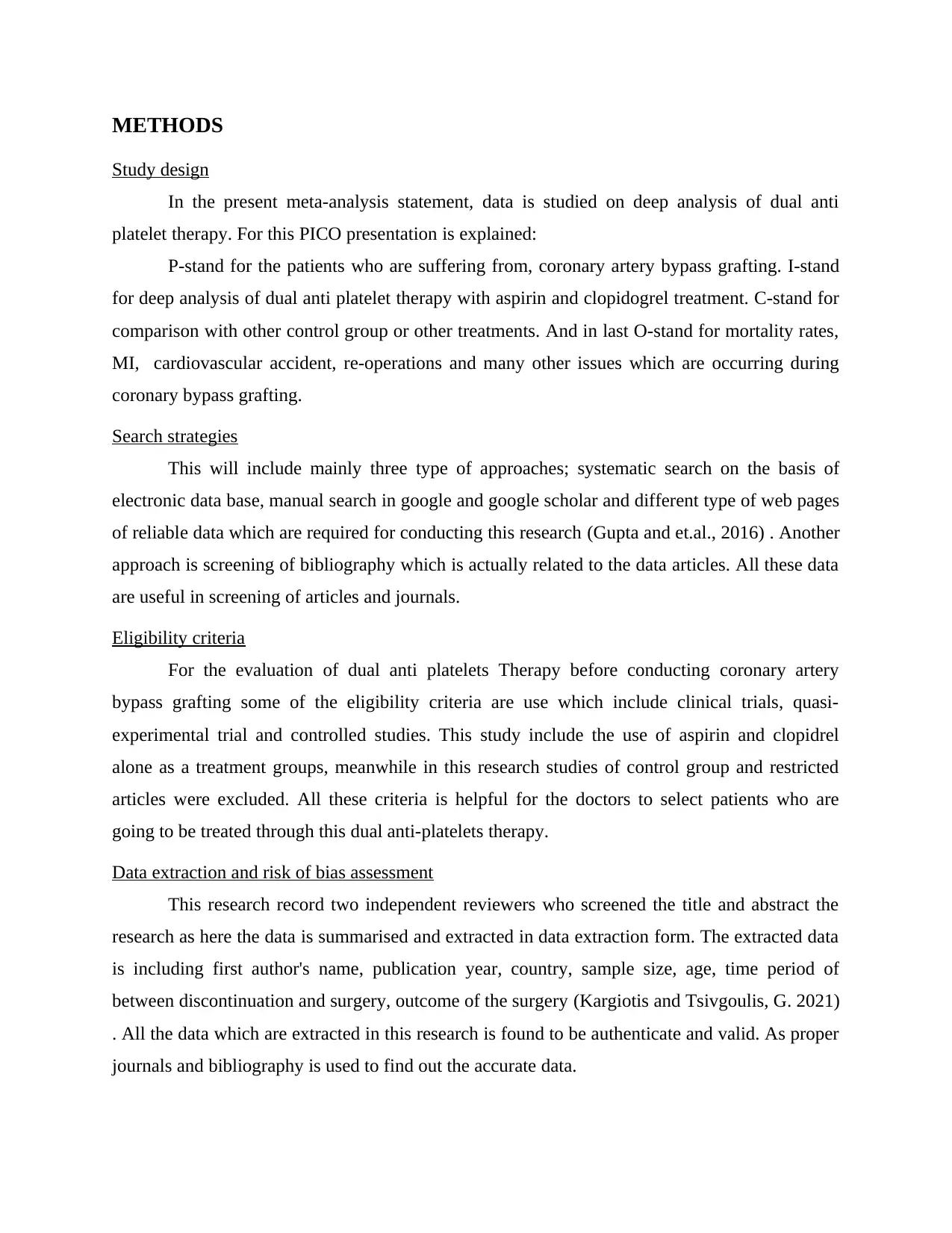
METHODS
Study design
In the present meta-analysis statement, data is studied on deep analysis of dual anti
platelet therapy. For this PICO presentation is explained:
P-stand for the patients who are suffering from, coronary artery bypass grafting. I-stand
for deep analysis of dual anti platelet therapy with aspirin and clopidogrel treatment. C-stand for
comparison with other control group or other treatments. And in last O-stand for mortality rates,
MI, cardiovascular accident, re-operations and many other issues which are occurring during
coronary bypass grafting.
Search strategies
This will include mainly three type of approaches; systematic search on the basis of
electronic data base, manual search in google and google scholar and different type of web pages
of reliable data which are required for conducting this research (Gupta and et.al., 2016) . Another
approach is screening of bibliography which is actually related to the data articles. All these data
are useful in screening of articles and journals.
Eligibility criteria
For the evaluation of dual anti platelets Therapy before conducting coronary artery
bypass grafting some of the eligibility criteria are use which include clinical trials, quasi-
experimental trial and controlled studies. This study include the use of aspirin and clopidrel
alone as a treatment groups, meanwhile in this research studies of control group and restricted
articles were excluded. All these criteria is helpful for the doctors to select patients who are
going to be treated through this dual anti-platelets therapy.
Data extraction and risk of bias assessment
This research record two independent reviewers who screened the title and abstract the
research as here the data is summarised and extracted in data extraction form. The extracted data
is including first author's name, publication year, country, sample size, age, time period of
between discontinuation and surgery, outcome of the surgery (Kargiotis and Tsivgoulis, G. 2021)
. All the data which are extracted in this research is found to be authenticate and valid. As proper
journals and bibliography is used to find out the accurate data.
Study design
In the present meta-analysis statement, data is studied on deep analysis of dual anti
platelet therapy. For this PICO presentation is explained:
P-stand for the patients who are suffering from, coronary artery bypass grafting. I-stand
for deep analysis of dual anti platelet therapy with aspirin and clopidogrel treatment. C-stand for
comparison with other control group or other treatments. And in last O-stand for mortality rates,
MI, cardiovascular accident, re-operations and many other issues which are occurring during
coronary bypass grafting.
Search strategies
This will include mainly three type of approaches; systematic search on the basis of
electronic data base, manual search in google and google scholar and different type of web pages
of reliable data which are required for conducting this research (Gupta and et.al., 2016) . Another
approach is screening of bibliography which is actually related to the data articles. All these data
are useful in screening of articles and journals.
Eligibility criteria
For the evaluation of dual anti platelets Therapy before conducting coronary artery
bypass grafting some of the eligibility criteria are use which include clinical trials, quasi-
experimental trial and controlled studies. This study include the use of aspirin and clopidrel
alone as a treatment groups, meanwhile in this research studies of control group and restricted
articles were excluded. All these criteria is helpful for the doctors to select patients who are
going to be treated through this dual anti-platelets therapy.
Data extraction and risk of bias assessment
This research record two independent reviewers who screened the title and abstract the
research as here the data is summarised and extracted in data extraction form. The extracted data
is including first author's name, publication year, country, sample size, age, time period of
between discontinuation and surgery, outcome of the surgery (Kargiotis and Tsivgoulis, G. 2021)
. All the data which are extracted in this research is found to be authenticate and valid. As proper
journals and bibliography is used to find out the accurate data.
Paraphrase This Document
Need a fresh take? Get an instant paraphrase of this document with our AI Paraphraser
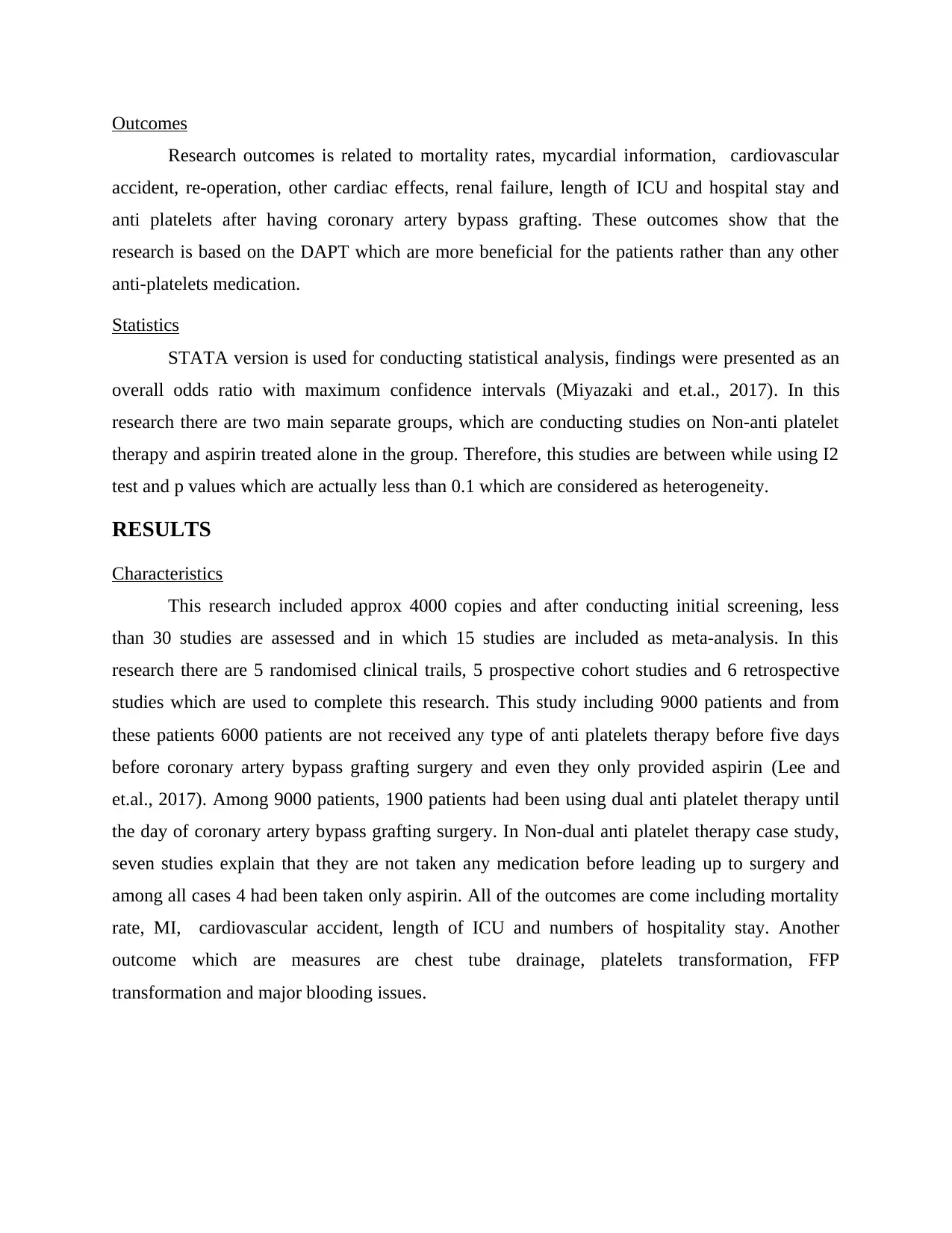
Outcomes
Research outcomes is related to mortality rates, mycardial information, cardiovascular
accident, re-operation, other cardiac effects, renal failure, length of ICU and hospital stay and
anti platelets after having coronary artery bypass grafting. These outcomes show that the
research is based on the DAPT which are more beneficial for the patients rather than any other
anti-platelets medication.
Statistics
STATA version is used for conducting statistical analysis, findings were presented as an
overall odds ratio with maximum confidence intervals (Miyazaki and et.al., 2017). In this
research there are two main separate groups, which are conducting studies on Non-anti platelet
therapy and aspirin treated alone in the group. Therefore, this studies are between while using I2
test and p values which are actually less than 0.1 which are considered as heterogeneity.
RESULTS
Characteristics
This research included approx 4000 copies and after conducting initial screening, less
than 30 studies are assessed and in which 15 studies are included as meta-analysis. In this
research there are 5 randomised clinical trails, 5 prospective cohort studies and 6 retrospective
studies which are used to complete this research. This study including 9000 patients and from
these patients 6000 patients are not received any type of anti platelets therapy before five days
before coronary artery bypass grafting surgery and even they only provided aspirin (Lee and
et.al., 2017). Among 9000 patients, 1900 patients had been using dual anti platelet therapy until
the day of coronary artery bypass grafting surgery. In Non-dual anti platelet therapy case study,
seven studies explain that they are not taken any medication before leading up to surgery and
among all cases 4 had been taken only aspirin. All of the outcomes are come including mortality
rate, MI, cardiovascular accident, length of ICU and numbers of hospitality stay. Another
outcome which are measures are chest tube drainage, platelets transformation, FFP
transformation and major blooding issues.
Research outcomes is related to mortality rates, mycardial information, cardiovascular
accident, re-operation, other cardiac effects, renal failure, length of ICU and hospital stay and
anti platelets after having coronary artery bypass grafting. These outcomes show that the
research is based on the DAPT which are more beneficial for the patients rather than any other
anti-platelets medication.
Statistics
STATA version is used for conducting statistical analysis, findings were presented as an
overall odds ratio with maximum confidence intervals (Miyazaki and et.al., 2017). In this
research there are two main separate groups, which are conducting studies on Non-anti platelet
therapy and aspirin treated alone in the group. Therefore, this studies are between while using I2
test and p values which are actually less than 0.1 which are considered as heterogeneity.
RESULTS
Characteristics
This research included approx 4000 copies and after conducting initial screening, less
than 30 studies are assessed and in which 15 studies are included as meta-analysis. In this
research there are 5 randomised clinical trails, 5 prospective cohort studies and 6 retrospective
studies which are used to complete this research. This study including 9000 patients and from
these patients 6000 patients are not received any type of anti platelets therapy before five days
before coronary artery bypass grafting surgery and even they only provided aspirin (Lee and
et.al., 2017). Among 9000 patients, 1900 patients had been using dual anti platelet therapy until
the day of coronary artery bypass grafting surgery. In Non-dual anti platelet therapy case study,
seven studies explain that they are not taken any medication before leading up to surgery and
among all cases 4 had been taken only aspirin. All of the outcomes are come including mortality
rate, MI, cardiovascular accident, length of ICU and numbers of hospitality stay. Another
outcome which are measures are chest tube drainage, platelets transformation, FFP
transformation and major blooding issues.
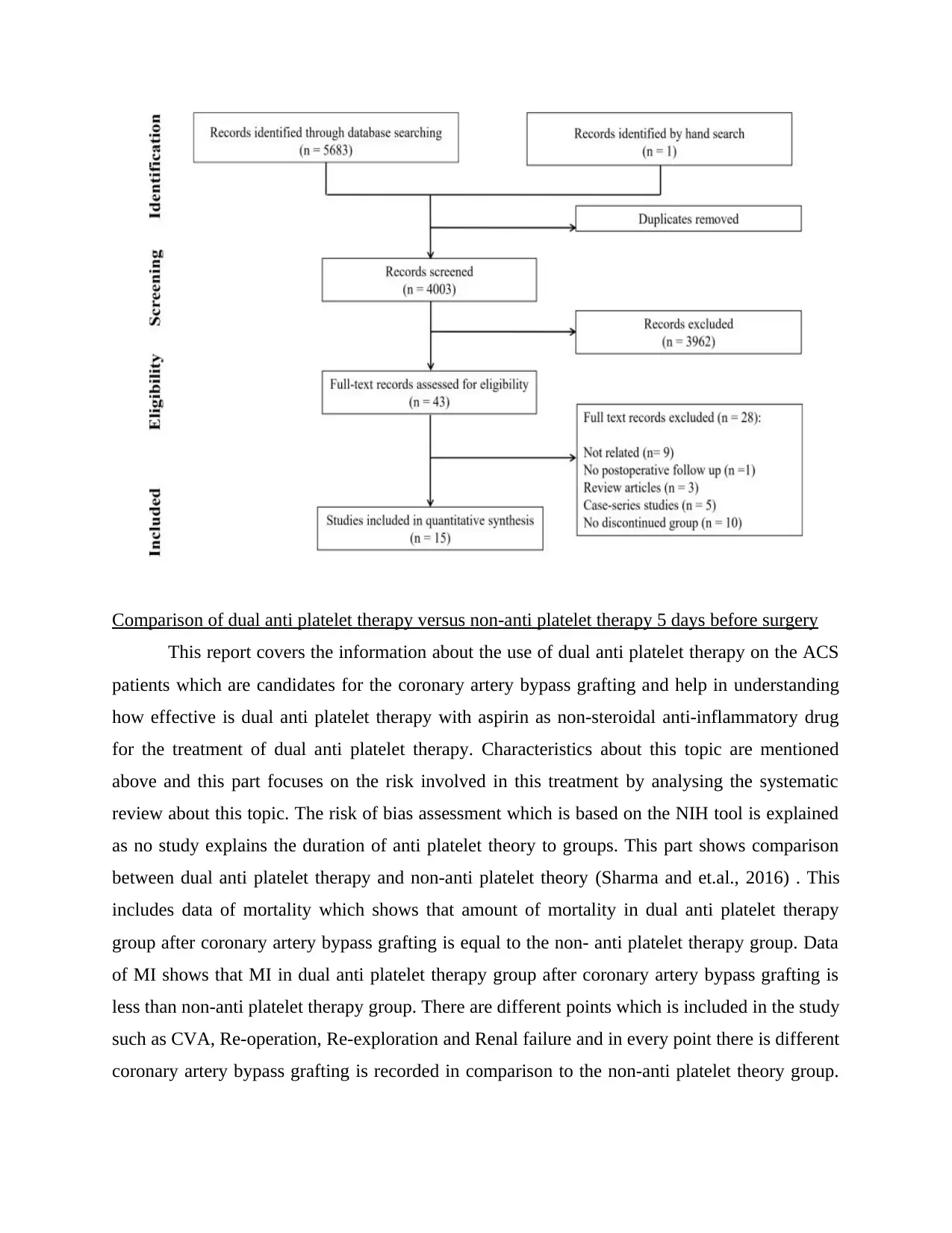
Comparison of dual anti platelet therapy versus non-anti platelet therapy 5 days before surgery
This report covers the information about the use of dual anti platelet therapy on the ACS
patients which are candidates for the coronary artery bypass grafting and help in understanding
how effective is dual anti platelet therapy with aspirin as non-steroidal anti-inflammatory drug
for the treatment of dual anti platelet therapy. Characteristics about this topic are mentioned
above and this part focuses on the risk involved in this treatment by analysing the systematic
review about this topic. The risk of bias assessment which is based on the NIH tool is explained
as no study explains the duration of anti platelet theory to groups. This part shows comparison
between dual anti platelet therapy and non-anti platelet theory (Sharma and et.al., 2016) . This
includes data of mortality which shows that amount of mortality in dual anti platelet therapy
group after coronary artery bypass grafting is equal to the non- anti platelet therapy group. Data
of MI shows that MI in dual anti platelet therapy group after coronary artery bypass grafting is
less than non-anti platelet therapy group. There are different points which is included in the study
such as CVA, Re-operation, Re-exploration and Renal failure and in every point there is different
coronary artery bypass grafting is recorded in comparison to the non-anti platelet theory group.
This report covers the information about the use of dual anti platelet therapy on the ACS
patients which are candidates for the coronary artery bypass grafting and help in understanding
how effective is dual anti platelet therapy with aspirin as non-steroidal anti-inflammatory drug
for the treatment of dual anti platelet therapy. Characteristics about this topic are mentioned
above and this part focuses on the risk involved in this treatment by analysing the systematic
review about this topic. The risk of bias assessment which is based on the NIH tool is explained
as no study explains the duration of anti platelet theory to groups. This part shows comparison
between dual anti platelet therapy and non-anti platelet theory (Sharma and et.al., 2016) . This
includes data of mortality which shows that amount of mortality in dual anti platelet therapy
group after coronary artery bypass grafting is equal to the non- anti platelet therapy group. Data
of MI shows that MI in dual anti platelet therapy group after coronary artery bypass grafting is
less than non-anti platelet therapy group. There are different points which is included in the study
such as CVA, Re-operation, Re-exploration and Renal failure and in every point there is different
coronary artery bypass grafting is recorded in comparison to the non-anti platelet theory group.
⊘ This is a preview!⊘
Do you want full access?
Subscribe today to unlock all pages.

Trusted by 1+ million students worldwide
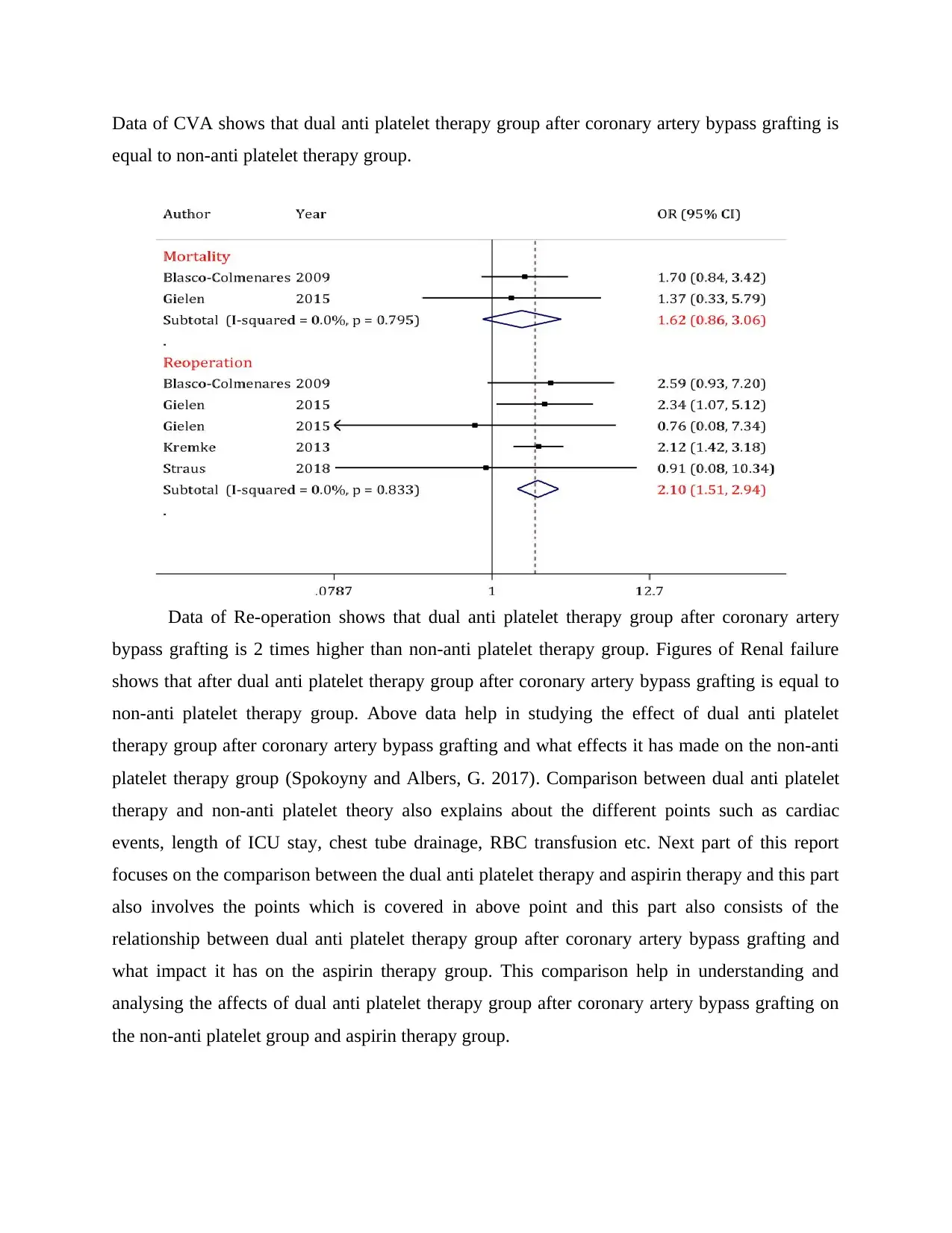
Data of CVA shows that dual anti platelet therapy group after coronary artery bypass grafting is
equal to non-anti platelet therapy group.
Data of Re-operation shows that dual anti platelet therapy group after coronary artery
bypass grafting is 2 times higher than non-anti platelet therapy group. Figures of Renal failure
shows that after dual anti platelet therapy group after coronary artery bypass grafting is equal to
non-anti platelet therapy group. Above data help in studying the effect of dual anti platelet
therapy group after coronary artery bypass grafting and what effects it has made on the non-anti
platelet therapy group (Spokoyny and Albers, G. 2017). Comparison between dual anti platelet
therapy and non-anti platelet theory also explains about the different points such as cardiac
events, length of ICU stay, chest tube drainage, RBC transfusion etc. Next part of this report
focuses on the comparison between the dual anti platelet therapy and aspirin therapy and this part
also involves the points which is covered in above point and this part also consists of the
relationship between dual anti platelet therapy group after coronary artery bypass grafting and
what impact it has on the aspirin therapy group. This comparison help in understanding and
analysing the affects of dual anti platelet therapy group after coronary artery bypass grafting on
the non-anti platelet group and aspirin therapy group.
equal to non-anti platelet therapy group.
Data of Re-operation shows that dual anti platelet therapy group after coronary artery
bypass grafting is 2 times higher than non-anti platelet therapy group. Figures of Renal failure
shows that after dual anti platelet therapy group after coronary artery bypass grafting is equal to
non-anti platelet therapy group. Above data help in studying the effect of dual anti platelet
therapy group after coronary artery bypass grafting and what effects it has made on the non-anti
platelet therapy group (Spokoyny and Albers, G. 2017). Comparison between dual anti platelet
therapy and non-anti platelet theory also explains about the different points such as cardiac
events, length of ICU stay, chest tube drainage, RBC transfusion etc. Next part of this report
focuses on the comparison between the dual anti platelet therapy and aspirin therapy and this part
also involves the points which is covered in above point and this part also consists of the
relationship between dual anti platelet therapy group after coronary artery bypass grafting and
what impact it has on the aspirin therapy group. This comparison help in understanding and
analysing the affects of dual anti platelet therapy group after coronary artery bypass grafting on
the non-anti platelet group and aspirin therapy group.
Paraphrase This Document
Need a fresh take? Get an instant paraphrase of this document with our AI Paraphraser
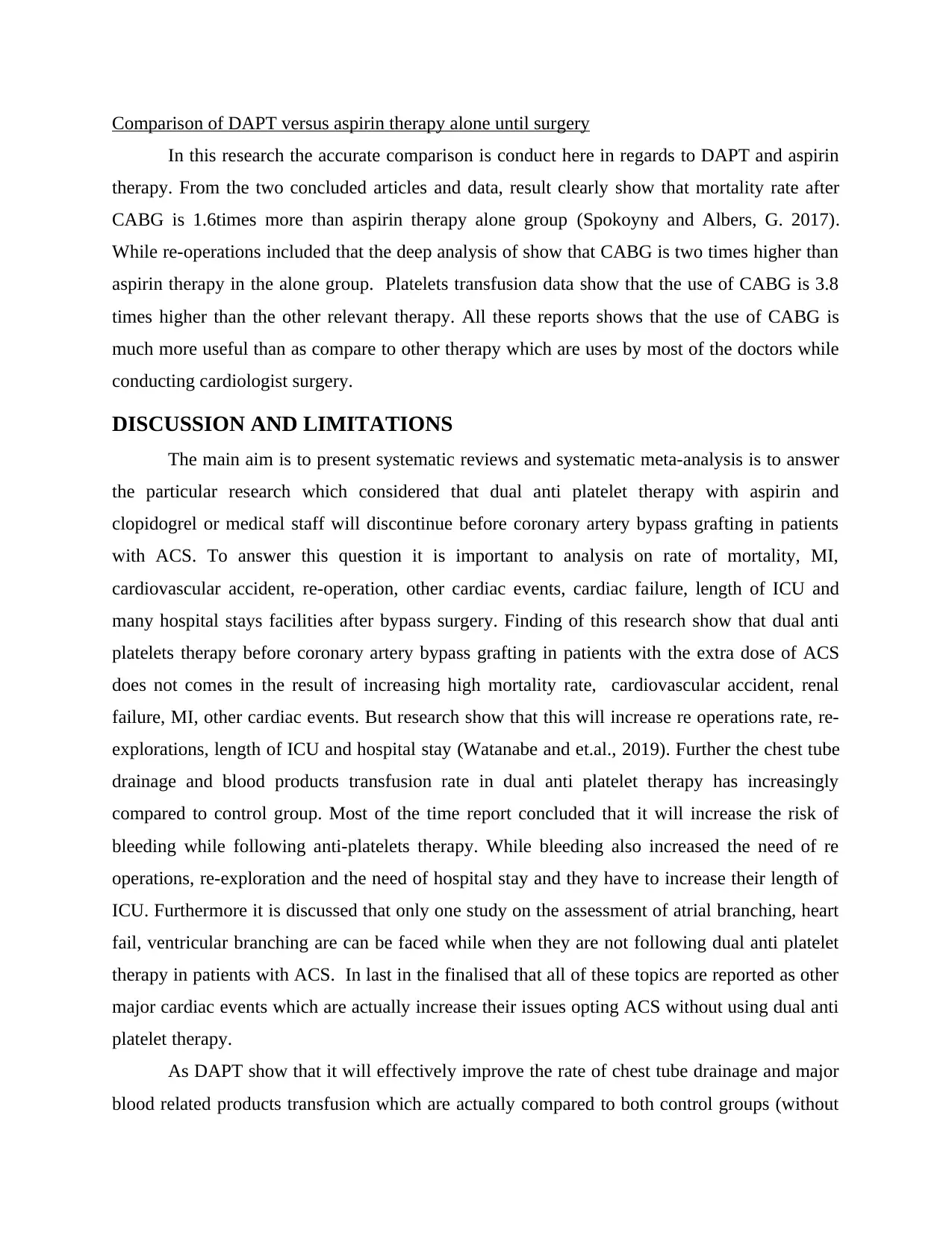
Comparison of DAPT versus aspirin therapy alone until surgery
In this research the accurate comparison is conduct here in regards to DAPT and aspirin
therapy. From the two concluded articles and data, result clearly show that mortality rate after
CABG is 1.6times more than aspirin therapy alone group (Spokoyny and Albers, G. 2017).
While re-operations included that the deep analysis of show that CABG is two times higher than
aspirin therapy in the alone group. Platelets transfusion data show that the use of CABG is 3.8
times higher than the other relevant therapy. All these reports shows that the use of CABG is
much more useful than as compare to other therapy which are uses by most of the doctors while
conducting cardiologist surgery.
DISCUSSION AND LIMITATIONS
The main aim is to present systematic reviews and systematic meta-analysis is to answer
the particular research which considered that dual anti platelet therapy with aspirin and
clopidogrel or medical staff will discontinue before coronary artery bypass grafting in patients
with ACS. To answer this question it is important to analysis on rate of mortality, MI,
cardiovascular accident, re-operation, other cardiac events, cardiac failure, length of ICU and
many hospital stays facilities after bypass surgery. Finding of this research show that dual anti
platelets therapy before coronary artery bypass grafting in patients with the extra dose of ACS
does not comes in the result of increasing high mortality rate, cardiovascular accident, renal
failure, MI, other cardiac events. But research show that this will increase re operations rate, re-
explorations, length of ICU and hospital stay (Watanabe and et.al., 2019). Further the chest tube
drainage and blood products transfusion rate in dual anti platelet therapy has increasingly
compared to control group. Most of the time report concluded that it will increase the risk of
bleeding while following anti-platelets therapy. While bleeding also increased the need of re
operations, re-exploration and the need of hospital stay and they have to increase their length of
ICU. Furthermore it is discussed that only one study on the assessment of atrial branching, heart
fail, ventricular branching are can be faced while when they are not following dual anti platelet
therapy in patients with ACS. In last in the finalised that all of these topics are reported as other
major cardiac events which are actually increase their issues opting ACS without using dual anti
platelet therapy.
As DAPT show that it will effectively improve the rate of chest tube drainage and major
blood related products transfusion which are actually compared to both control groups (without
In this research the accurate comparison is conduct here in regards to DAPT and aspirin
therapy. From the two concluded articles and data, result clearly show that mortality rate after
CABG is 1.6times more than aspirin therapy alone group (Spokoyny and Albers, G. 2017).
While re-operations included that the deep analysis of show that CABG is two times higher than
aspirin therapy in the alone group. Platelets transfusion data show that the use of CABG is 3.8
times higher than the other relevant therapy. All these reports shows that the use of CABG is
much more useful than as compare to other therapy which are uses by most of the doctors while
conducting cardiologist surgery.
DISCUSSION AND LIMITATIONS
The main aim is to present systematic reviews and systematic meta-analysis is to answer
the particular research which considered that dual anti platelet therapy with aspirin and
clopidogrel or medical staff will discontinue before coronary artery bypass grafting in patients
with ACS. To answer this question it is important to analysis on rate of mortality, MI,
cardiovascular accident, re-operation, other cardiac events, cardiac failure, length of ICU and
many hospital stays facilities after bypass surgery. Finding of this research show that dual anti
platelets therapy before coronary artery bypass grafting in patients with the extra dose of ACS
does not comes in the result of increasing high mortality rate, cardiovascular accident, renal
failure, MI, other cardiac events. But research show that this will increase re operations rate, re-
explorations, length of ICU and hospital stay (Watanabe and et.al., 2019). Further the chest tube
drainage and blood products transfusion rate in dual anti platelet therapy has increasingly
compared to control group. Most of the time report concluded that it will increase the risk of
bleeding while following anti-platelets therapy. While bleeding also increased the need of re
operations, re-exploration and the need of hospital stay and they have to increase their length of
ICU. Furthermore it is discussed that only one study on the assessment of atrial branching, heart
fail, ventricular branching are can be faced while when they are not following dual anti platelet
therapy in patients with ACS. In last in the finalised that all of these topics are reported as other
major cardiac events which are actually increase their issues opting ACS without using dual anti
platelet therapy.
As DAPT show that it will effectively improve the rate of chest tube drainage and major
blood related products transfusion which are actually compared to both control groups (without
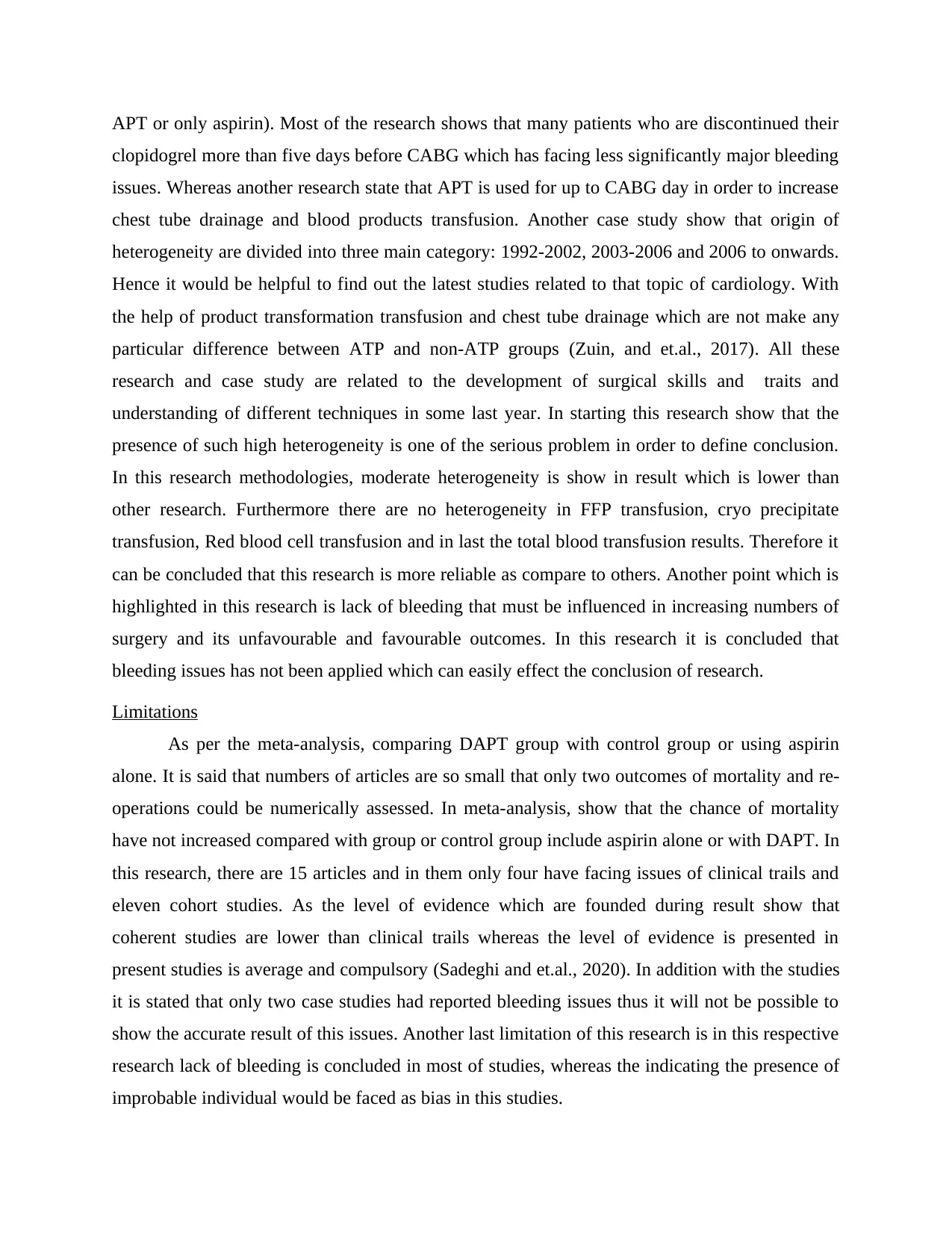
APT or only aspirin). Most of the research shows that many patients who are discontinued their
clopidogrel more than five days before CABG which has facing less significantly major bleeding
issues. Whereas another research state that APT is used for up to CABG day in order to increase
chest tube drainage and blood products transfusion. Another case study show that origin of
heterogeneity are divided into three main category: 1992-2002, 2003-2006 and 2006 to onwards.
Hence it would be helpful to find out the latest studies related to that topic of cardiology. With
the help of product transformation transfusion and chest tube drainage which are not make any
particular difference between ATP and non-ATP groups (Zuin, and et.al., 2017). All these
research and case study are related to the development of surgical skills and traits and
understanding of different techniques in some last year. In starting this research show that the
presence of such high heterogeneity is one of the serious problem in order to define conclusion.
In this research methodologies, moderate heterogeneity is show in result which is lower than
other research. Furthermore there are no heterogeneity in FFP transfusion, cryo precipitate
transfusion, Red blood cell transfusion and in last the total blood transfusion results. Therefore it
can be concluded that this research is more reliable as compare to others. Another point which is
highlighted in this research is lack of bleeding that must be influenced in increasing numbers of
surgery and its unfavourable and favourable outcomes. In this research it is concluded that
bleeding issues has not been applied which can easily effect the conclusion of research.
Limitations
As per the meta-analysis, comparing DAPT group with control group or using aspirin
alone. It is said that numbers of articles are so small that only two outcomes of mortality and re-
operations could be numerically assessed. In meta-analysis, show that the chance of mortality
have not increased compared with group or control group include aspirin alone or with DAPT. In
this research, there are 15 articles and in them only four have facing issues of clinical trails and
eleven cohort studies. As the level of evidence which are founded during result show that
coherent studies are lower than clinical trails whereas the level of evidence is presented in
present studies is average and compulsory (Sadeghi and et.al., 2020). In addition with the studies
it is stated that only two case studies had reported bleeding issues thus it will not be possible to
show the accurate result of this issues. Another last limitation of this research is in this respective
research lack of bleeding is concluded in most of studies, whereas the indicating the presence of
improbable individual would be faced as bias in this studies.
clopidogrel more than five days before CABG which has facing less significantly major bleeding
issues. Whereas another research state that APT is used for up to CABG day in order to increase
chest tube drainage and blood products transfusion. Another case study show that origin of
heterogeneity are divided into three main category: 1992-2002, 2003-2006 and 2006 to onwards.
Hence it would be helpful to find out the latest studies related to that topic of cardiology. With
the help of product transformation transfusion and chest tube drainage which are not make any
particular difference between ATP and non-ATP groups (Zuin, and et.al., 2017). All these
research and case study are related to the development of surgical skills and traits and
understanding of different techniques in some last year. In starting this research show that the
presence of such high heterogeneity is one of the serious problem in order to define conclusion.
In this research methodologies, moderate heterogeneity is show in result which is lower than
other research. Furthermore there are no heterogeneity in FFP transfusion, cryo precipitate
transfusion, Red blood cell transfusion and in last the total blood transfusion results. Therefore it
can be concluded that this research is more reliable as compare to others. Another point which is
highlighted in this research is lack of bleeding that must be influenced in increasing numbers of
surgery and its unfavourable and favourable outcomes. In this research it is concluded that
bleeding issues has not been applied which can easily effect the conclusion of research.
Limitations
As per the meta-analysis, comparing DAPT group with control group or using aspirin
alone. It is said that numbers of articles are so small that only two outcomes of mortality and re-
operations could be numerically assessed. In meta-analysis, show that the chance of mortality
have not increased compared with group or control group include aspirin alone or with DAPT. In
this research, there are 15 articles and in them only four have facing issues of clinical trails and
eleven cohort studies. As the level of evidence which are founded during result show that
coherent studies are lower than clinical trails whereas the level of evidence is presented in
present studies is average and compulsory (Sadeghi and et.al., 2020). In addition with the studies
it is stated that only two case studies had reported bleeding issues thus it will not be possible to
show the accurate result of this issues. Another last limitation of this research is in this respective
research lack of bleeding is concluded in most of studies, whereas the indicating the presence of
improbable individual would be faced as bias in this studies.
⊘ This is a preview!⊘
Do you want full access?
Subscribe today to unlock all pages.

Trusted by 1+ million students worldwide
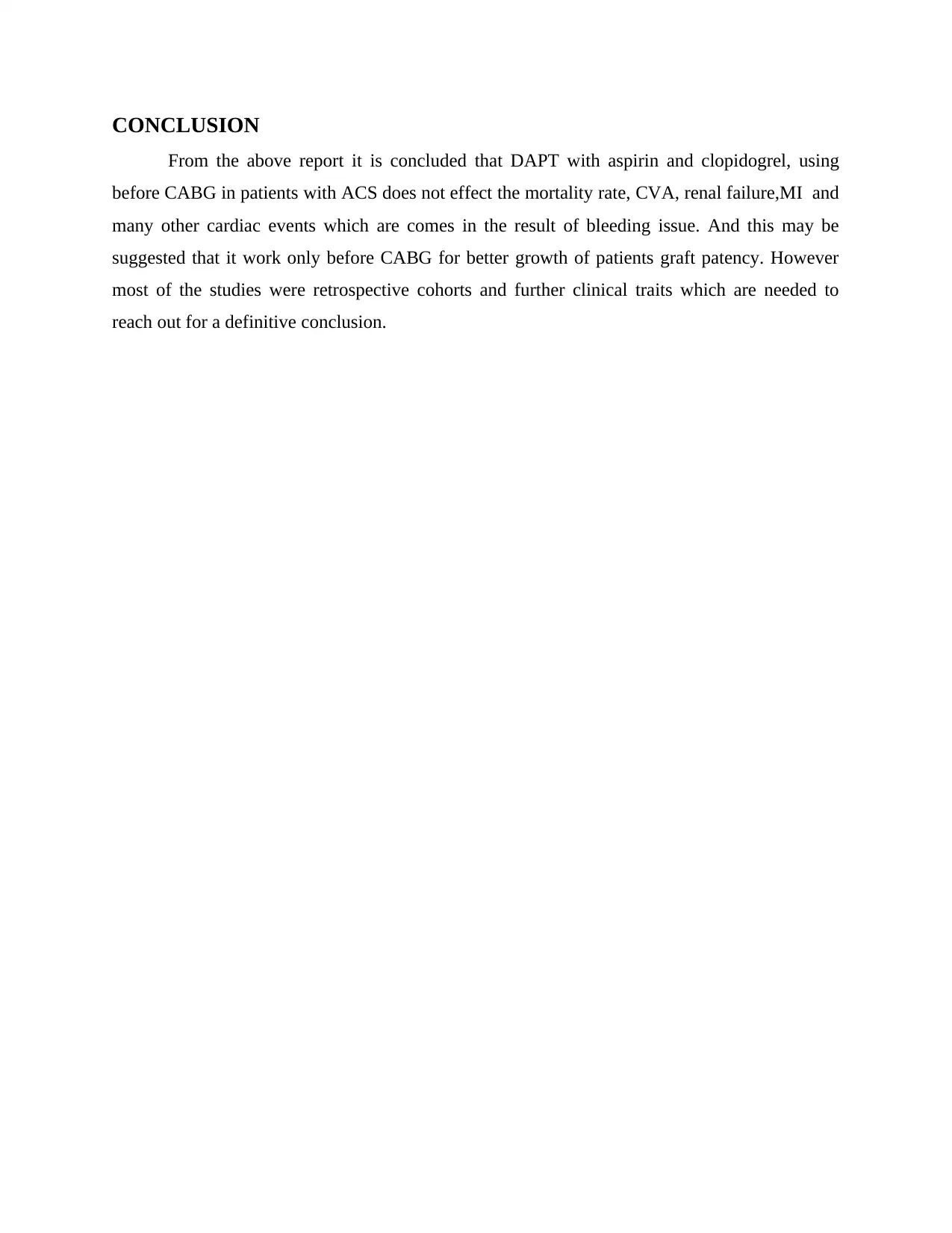
CONCLUSION
From the above report it is concluded that DAPT with aspirin and clopidogrel, using
before CABG in patients with ACS does not effect the mortality rate, CVA, renal failure,MI and
many other cardiac events which are comes in the result of bleeding issue. And this may be
suggested that it work only before CABG for better growth of patients graft patency. However
most of the studies were retrospective cohorts and further clinical traits which are needed to
reach out for a definitive conclusion.
From the above report it is concluded that DAPT with aspirin and clopidogrel, using
before CABG in patients with ACS does not effect the mortality rate, CVA, renal failure,MI and
many other cardiac events which are comes in the result of bleeding issue. And this may be
suggested that it work only before CABG for better growth of patients graft patency. However
most of the studies were retrospective cohorts and further clinical traits which are needed to
reach out for a definitive conclusion.
Paraphrase This Document
Need a fresh take? Get an instant paraphrase of this document with our AI Paraphraser
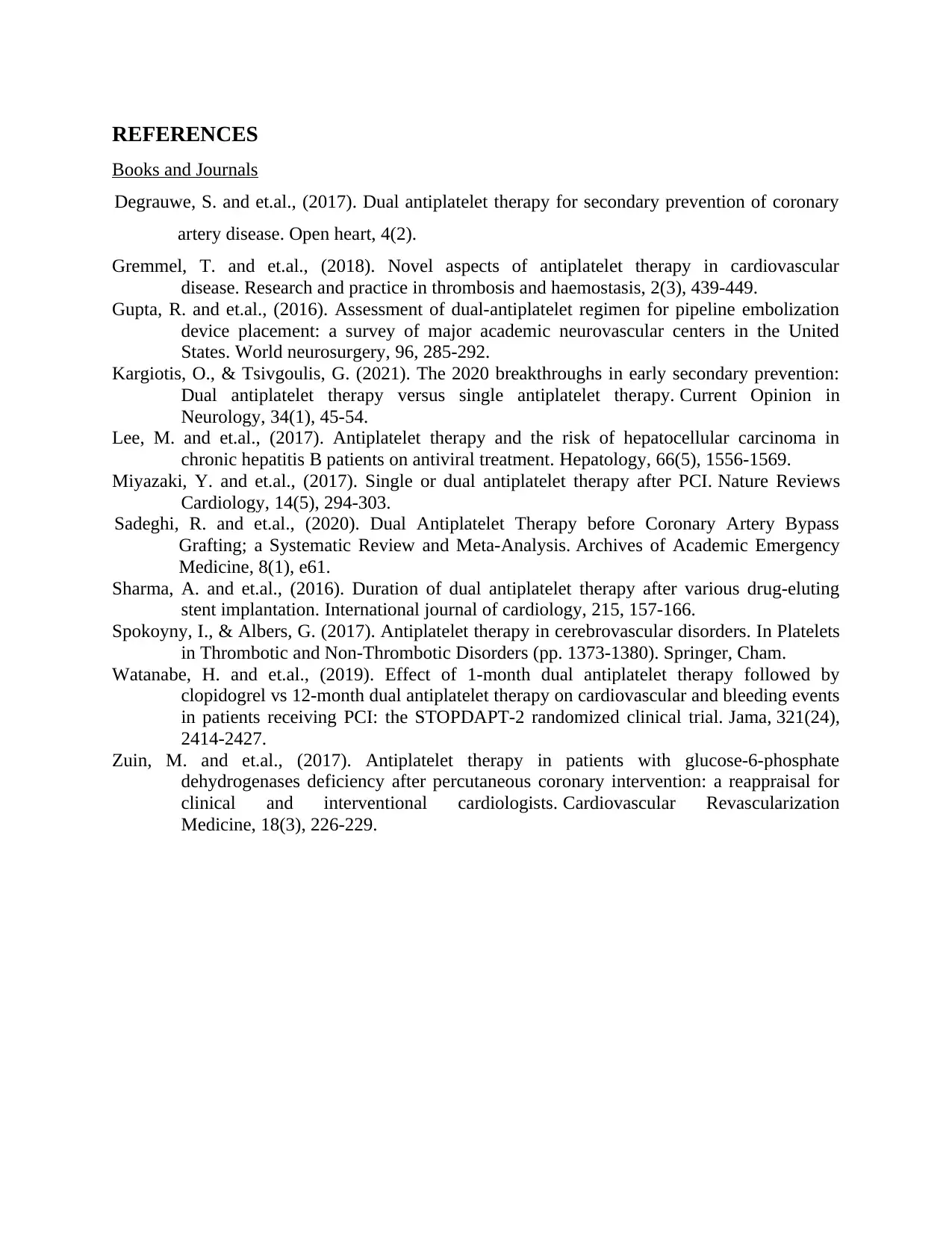
REFERENCES
Books and Journals
Degrauwe, S. and et.al., (2017). Dual antiplatelet therapy for secondary prevention of coronary
artery disease. Open heart, 4(2).
Gremmel, T. and et.al., (2018). Novel aspects of antiplatelet therapy in cardiovascular
disease. Research and practice in thrombosis and haemostasis, 2(3), 439-449.
Gupta, R. and et.al., (2016). Assessment of dual-antiplatelet regimen for pipeline embolization
device placement: a survey of major academic neurovascular centers in the United
States. World neurosurgery, 96, 285-292.
Kargiotis, O., & Tsivgoulis, G. (2021). The 2020 breakthroughs in early secondary prevention:
Dual antiplatelet therapy versus single antiplatelet therapy. Current Opinion in
Neurology, 34(1), 45-54.
Lee, M. and et.al., (2017). Antiplatelet therapy and the risk of hepatocellular carcinoma in
chronic hepatitis B patients on antiviral treatment. Hepatology, 66(5), 1556-1569.
Miyazaki, Y. and et.al., (2017). Single or dual antiplatelet therapy after PCI. Nature Reviews
Cardiology, 14(5), 294-303.
Sadeghi, R. and et.al., (2020). Dual Antiplatelet Therapy before Coronary Artery Bypass
Grafting; a Systematic Review and Meta-Analysis. Archives of Academic Emergency
Medicine, 8(1), e61.
Sharma, A. and et.al., (2016). Duration of dual antiplatelet therapy after various drug-eluting
stent implantation. International journal of cardiology, 215, 157-166.
Spokoyny, I., & Albers, G. (2017). Antiplatelet therapy in cerebrovascular disorders. In Platelets
in Thrombotic and Non-Thrombotic Disorders (pp. 1373-1380). Springer, Cham.
Watanabe, H. and et.al., (2019). Effect of 1-month dual antiplatelet therapy followed by
clopidogrel vs 12-month dual antiplatelet therapy on cardiovascular and bleeding events
in patients receiving PCI: the STOPDAPT-2 randomized clinical trial. Jama, 321(24),
2414-2427.
Zuin, M. and et.al., (2017). Antiplatelet therapy in patients with glucose-6-phosphate
dehydrogenases deficiency after percutaneous coronary intervention: a reappraisal for
clinical and interventional cardiologists. Cardiovascular Revascularization
Medicine, 18(3), 226-229.
Books and Journals
Degrauwe, S. and et.al., (2017). Dual antiplatelet therapy for secondary prevention of coronary
artery disease. Open heart, 4(2).
Gremmel, T. and et.al., (2018). Novel aspects of antiplatelet therapy in cardiovascular
disease. Research and practice in thrombosis and haemostasis, 2(3), 439-449.
Gupta, R. and et.al., (2016). Assessment of dual-antiplatelet regimen for pipeline embolization
device placement: a survey of major academic neurovascular centers in the United
States. World neurosurgery, 96, 285-292.
Kargiotis, O., & Tsivgoulis, G. (2021). The 2020 breakthroughs in early secondary prevention:
Dual antiplatelet therapy versus single antiplatelet therapy. Current Opinion in
Neurology, 34(1), 45-54.
Lee, M. and et.al., (2017). Antiplatelet therapy and the risk of hepatocellular carcinoma in
chronic hepatitis B patients on antiviral treatment. Hepatology, 66(5), 1556-1569.
Miyazaki, Y. and et.al., (2017). Single or dual antiplatelet therapy after PCI. Nature Reviews
Cardiology, 14(5), 294-303.
Sadeghi, R. and et.al., (2020). Dual Antiplatelet Therapy before Coronary Artery Bypass
Grafting; a Systematic Review and Meta-Analysis. Archives of Academic Emergency
Medicine, 8(1), e61.
Sharma, A. and et.al., (2016). Duration of dual antiplatelet therapy after various drug-eluting
stent implantation. International journal of cardiology, 215, 157-166.
Spokoyny, I., & Albers, G. (2017). Antiplatelet therapy in cerebrovascular disorders. In Platelets
in Thrombotic and Non-Thrombotic Disorders (pp. 1373-1380). Springer, Cham.
Watanabe, H. and et.al., (2019). Effect of 1-month dual antiplatelet therapy followed by
clopidogrel vs 12-month dual antiplatelet therapy on cardiovascular and bleeding events
in patients receiving PCI: the STOPDAPT-2 randomized clinical trial. Jama, 321(24),
2414-2427.
Zuin, M. and et.al., (2017). Antiplatelet therapy in patients with glucose-6-phosphate
dehydrogenases deficiency after percutaneous coronary intervention: a reappraisal for
clinical and interventional cardiologists. Cardiovascular Revascularization
Medicine, 18(3), 226-229.
1 out of 11
Related Documents
Your All-in-One AI-Powered Toolkit for Academic Success.
+13062052269
info@desklib.com
Available 24*7 on WhatsApp / Email
![[object Object]](/_next/static/media/star-bottom.7253800d.svg)
Unlock your academic potential
Copyright © 2020–2026 A2Z Services. All Rights Reserved. Developed and managed by ZUCOL.





